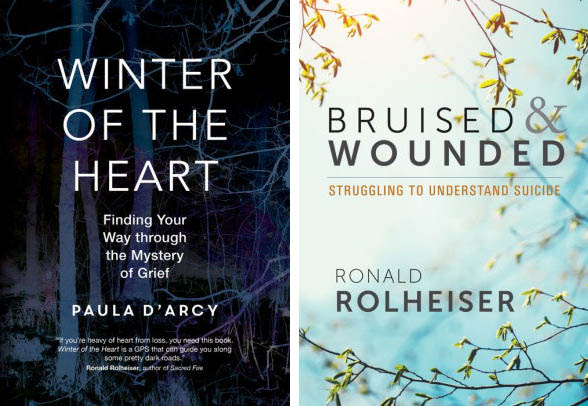
“Winter of the Heart: Finding Your Way Through the Mystery of Grief”
by Paula D’Arcy.
Ave Maria Press (Notre Dame, Indiana, 2018).
50 pp., $6.95.
“Bruised and Wounded: Struggling to Understand Suicide”
by Ronald Rolheiser.
Paraclete Press (Brewster, Massachusetts, 2018).
77 pp., $10.99.
When someone we love dies, most people experience grief. That grief can take many shapes and forms, can last for years or for a short time, and can be mild or intense — or both — during different times of the grief period.
Paula D’Arcy, a former psychotherapist and a current retreat leader and author, walks us through a variety of these aspects in her book, “Winter of the Heart: Finding Your Way Through the Mystery of Grief.”
While she approaches the topic from a reasoned and analytical view, she writes as someone who has experienced the process of grief in a most personal and devastating way: Her husband and young daughter were killed in an auto accident.
[hotblock]
When she writes that the questions raised during the grieving process “can be overwhelming, and they are not easily sorted,” the reader senses that she has experienced this firsthand. Later on the same page when she explains that grief can be both a formidable foe and a fierce ally, one can understand that she has personally surrendered herself to God during a time of “deep brokenness” and tremendous pain.
At 50 pages in length, the book can easily be read quickly but to do so would take away from the wisdom and insight that D’Arcy has so painfully gained. This is a book to read slowly and return to repeatedly to chew on the many nuggets she offers. Most chapters are only a few pages long. Also in each chapter steps for moving through the grieving process are highlighted.
This is a book to be shared with those experiencing grief and those who wish to understand what others are experiencing.
Father Ron Rolheiser is a prolific writer and speaker. Many of his works look at complex theological issues, such as the human heart’s search for God (“Holy Longing”) and they are written in a style that is inviting and informative. Here he takes on the difficult issue of suicide in his usual style, writing with both compassion and empathy.
Father Rolheiser has experienced the loss of friends in this manner, and he has comforted others at the time of suicide in their families. In his words one feels comforted.
Throughout this little book Father Rolheiser confronts the stigma that suicide leaves, both for the individual who takes the life and for those left behind. He notes that “if someone dies in a morally compromised situation … the goodness of that life and heart should not be judged by the circumstances of that death. Death caught that person on a down bounce” which does not offer “a true judgment as to the goodness of his or her heart.”
He writes that suicide is a disease, like cancer, and that those who commit suicide are usually sensitive. He notes that those who die at their own hands can be trusted to the “infinite understanding and compassion” of God.
This book offers hope and healing to those who have experienced the loss of a loved one or anyone trying to understand the topic.
***
Mulhall is a catechist living in Louisville, Kentucky.
PREVIOUS: Pope calls for new alliance between young, old to change the world
NEXT: Story of Army chaplain in Iraq shows an ‘Indivisible’ marriage



Share this story